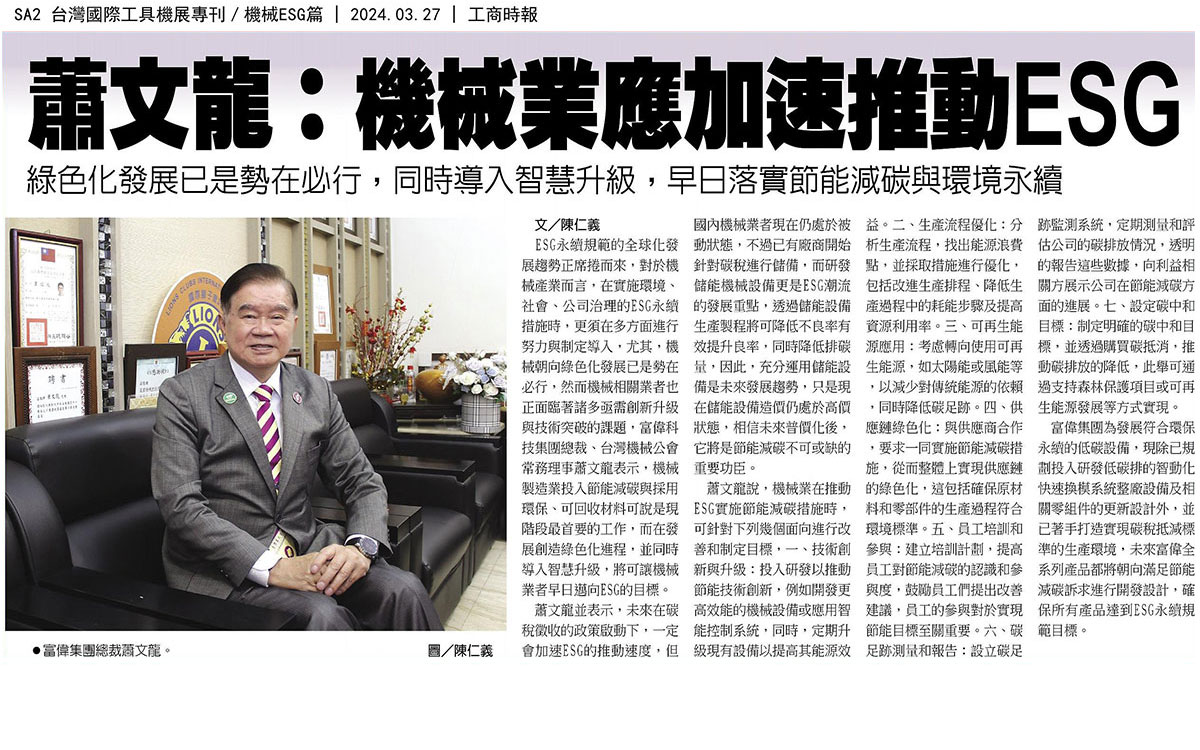President Xiao Wenlong of Forwell Group urges the machinery industry to embrace green development and embrace the ESG sustainability trend.
2024/03/27

ESG sustainability standards are becoming increasingly globalized, and for the machinery industry, implementing environmental, social, and corporate governance (ESG) sustainable measures requires efforts and introductions in various aspects. Particularly, the shift towards green development in machinery is imperative. However, industry players are also facing numerous challenges that urgently require innovation and technological breakthroughs. Xiao Wenlong, President of Forwell Group and Executive Director of the Taiwan Machinery Association, stated that investing in energy-saving, carbon-reducing measures and adopting environmentally friendly, recyclable materials are the most crucial tasks at this stage. Furthermore, advancing towards green development and simultaneously incorporating intelligent upgrades will enable machinery operators to achieve ESG goals sooner.
Xiao Wenlong also stated that with the initiation of carbon tax policies in the future, the pace of ESG promotion will undoubtedly accelerate. However, domestic machinery operators are currently in a passive state. Nevertheless, some companies have begun to prepare for carbon taxes, with research and development of energy storage machinery equipment being a focal point of ESG trends. Through the production process of energy storage equipment, it is possible to reduce defect rates, effectively improve yield, and simultaneously decrease carbon emissions. Therefore, fully utilizing energy storage equipment is a future development trend. However, the current high cost of energy storage equipment is a challenge, but it is believed that it will become an indispensable contributor to energy saving and carbon reduction after it becomes more affordable in the future.
Xiao Wenlong said that when promoting ESG implementation in the machinery industry through energy-saving and carbon-reducing measures, improvements and objectives can be made in the following areas:
1. Technological innovation and upgrading: Invest in research and development to promote energy-saving technological innovations, such as developing more efficient machinery equipment or applying intelligent control systems. Additionally, regularly upgrading existing equipment to enhance its energy efficiency.
2. Production process optimization: Analyze production processes to identify energy waste points and take measures to optimize them, including improving production scheduling, reducing energy-consuming steps in the production process, and increasing resource utilization.
3. Application of renewable energy: Consider transitioning to the use of renewable energy sources, such as solar or wind energy, to reduce reliance on traditional energy sources and simultaneously decrease carbon footprints.
4. Greening of the supply chain: Collaborate with suppliers to jointly implement energy-saving and carbon-reducing measures, thereby achieving overall greening of the supply chain, which includes ensuring that the production processes of raw materials and components meet environmental standards.
5. Employee training and involvement: Establish training programs to increase employees' awareness and participation in energy-saving and carbon-reducing efforts, encourage employees to make improvement suggestions, as employee involvement is crucial for achieving energy-saving goals.
6. Measurement and reporting of carbon footprints: Establish a carbon footprint monitoring system, regularly measure and evaluate the company's carbon emissions, and transparently report these data to stakeholders to demonstrate the company's progress in energy saving and carbon reduction.
7. Setting carbon neutrality goals: Set clear carbon neutrality goals and promote the reduction of carbon emissions through carbon offsetting, which can be achieved by supporting forest conservation projects or renewable energy development, among other methods.
Forwell Group is developing low-carbon equipment that meets environmental sustainability requirements. In addition to planning to invest in research and development of low-carbon emission intelligent rapid mold change system equipment and related components, Forwell Group has also begun to create a production environment that meets carbon tax offset standards. In the future, all products of Forwell Group will be developed and designed to meet energy-saving and carbon-reducing demands, ensuring that all products meet ESG sustainability standards.


